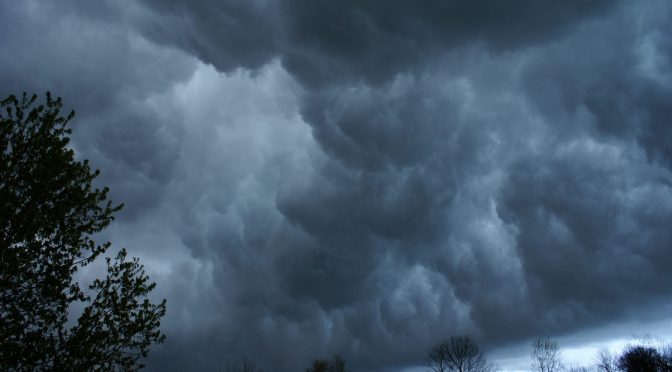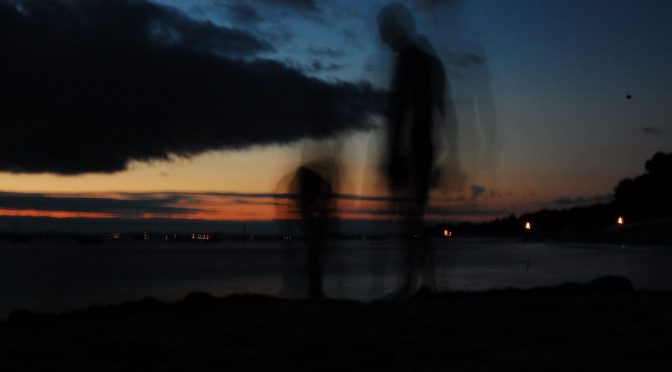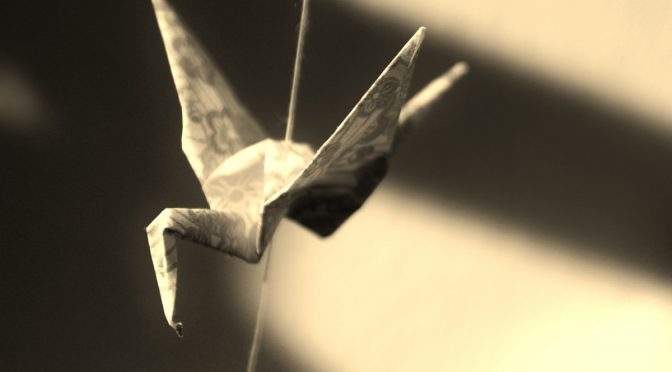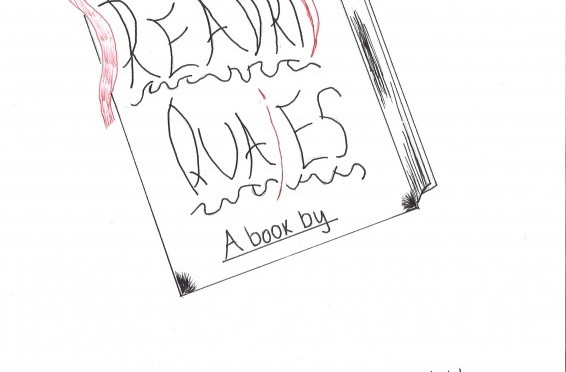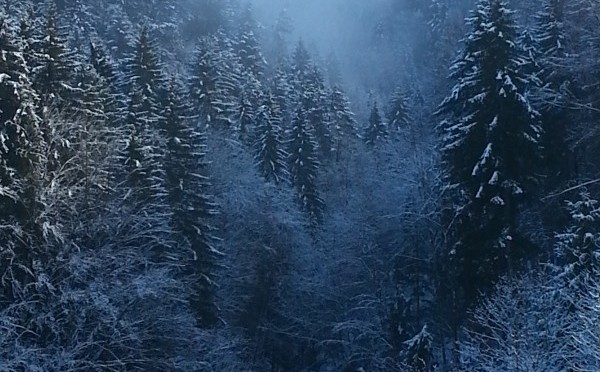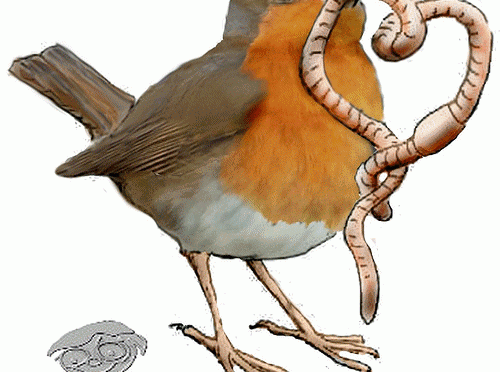Image: ‘Animated Robin Valentine’ © Robin Hutton. Flickr.com
Author: Elizabeth Leeman
Speaking With Birds
1869
~
The small metal gate creaked open as I pushed it inward and walked onto the Dickinson propriety for the first time. I took a step on the small stone pathway that led up to the Homestead house. The garden surrounding it was plush green, filled with small stout bushes and tall thin trees. There was a rose bed to one side with yellow and red roses in bloom. I looked up at the house, it seemed rather grand to me. The pale yellow façade and dark green shutters stared down at me. I could see white curtains behind each windowpane. I saw one of the curtains move suddenly and I realized it was not a curtain at all. A women dressed in white had been standing behind the glass watching me.
I was still looking up at the first story window from where she had disappeared from when a Nightingale began to sing. I turned to look for the source of the melody. I followed the sound of his song with my eyes trying to find him. I saw him perched in a large lilac tree by the main entrance. I walked up to it. The smell of the tree’s flowers was overwhelming. I stroked the strap of the bag I was carrying. I could feel it getting wet from my moist hands. I walked up the steps to the main entrance; my bag felt heavy all of a sudden. I swallowed hard as I looked at the white door in front of me.
‘It’s only temporary,’ I said to the Nightingale who chirped at me in response.
‘Oh, shut up.’
He flew away singing louder than before.
‘You’re probably right,’ I said and knocked on the large white door.
I heard small quick footsteps approaching behind the wall. I imagined it must be the woman in the white dress. I caught my reflection in the window next to the door. My frizzy black hair was pulled tight in a bun but a wild strand had gotten loose. I tried to tuck it back but it refused. My freckles and big blue eyes stared back at me, mocking my attempts to look presentable. The door swung open, making me jump. A short woman who was out of breath and wearing a dark blue dress looked up at me. She had round blotchy red cheeks and big brown eyes with long lashes. Her eyes seemed to sparkle as if she had just plays some mischievous prank on someone and was waiting for them to find out about it. I thought she was quite pretty.
‘Hello, my name is Margaret, I’m your new-‘
‘Ah you’re here, good, good,’ she said cutting me off and still gasping for breath ‘well, come in, come in.’
She ushered me into a narrow hallway. The wallpaper was a silver white color with a fancy design on it. It looked so rich I felt my hand twitch. I wanted to reach out and touch it but the woman was walking away quickly, her small heels tapping against the wooden floorboards as she went. We turned right in front of a staircase going to an upper level. There was a dark carpet on the stairs and a white bannister to its side. We turned again, went through a kitchen and into a washroom. She led me up some stairs into a dark hallway. As we walked she explained what my main chores would be:
‘As you can see the house is big and requires a lot of work. You are our only maid. You will be required to clean the house of course, do the laundry, the ironing, make soap, do the dying, press the laundry, hang it, do the dishes, the dusting, the mending and the cooking. But not the bread mind you. Emily bakes the bread. Make sure you stay out of her way when she does. Oh and you’re also responsible for feeding the cats and chickens.’
We continued up the stairs and I saw three doors lined against the wall.
‘The one at the back is yours. Here are your keys. This is the one for your room.’ She said, pointing at a large key with a small pink ribbon attached to it.
‘The others are for the rest of the house. This one is to the main entrance.’ She finished pointing at a key with a blue ribbon on it. ‘Leave your things in your room and follow me.
I did as I was told. I did not even think to look at my new room. My mind already thinking about the amount of work this house would generate. I followed the mistress to the front of the first floor.
‘I’m Miss Lavinia Dickinson. You can ask me any questions you might have. You will also be working for my sister Miss Dickinson as well as my parents Mr and Mrs Dickinson. You won’t see much of Mr Dickinson, because he travels a lot.’
We passed through a small passage and were back in their part of the house. The white wallpaper called out to me again. Miss Lavinia turned to me and brought one finger to her mouth showing me to be silent. We walked passed a door that she pointed at without saying anything. I looked at the door. There was nothing special about it. It was just a white door with a white doorknob. My new employer did not stop in front of it but continued down a flight of stairs.
Once we had made our way back into the kitchen, she turned to face me.
‘The door, you saw it?’
I nodded, my eyes widening.
‘That’s Miss Dickinson’s room. You are not to disturb her when she is in her room. When she comes down to bake bread, you will have time to clean her space. Be careful you leave everything as you find it. If you pick up a pen to clean under it, then you must put it back exactly where you found it. Do you understand?’
I nodded again.
‘Good. Emily – Miss Dickinson to you, I mean, is very particular but that’s none of your concern. You may not ask questions about that. And under no circumstances must you perpetuate the ridiculous rumors that circulate about her in the town. Do I make myself clear?’
I nodded again.
I heard footsteps coming towards the kitchen and turned to look at its owner.
‘Lavinia I’m going to the market. Would you like to join me?’
A tall woman with strict features was in the doorway. Miss Lavinia introduced her as Mrs Dickinson. I was afraid of the old woman then and there. She seemed stern and cold. I did not know it yet, but my path would hardly cross hers during the time I would work at the Homestead house. When it did, she usual ignored me, as I was the help.
When Miss Lavinia had left I began preparing the evening dinner, my mind full of questions about Miss Dickinson I knew I could not ask or have answers to.
The next day I was preparing lunch when she walked into the kitchen. I had not seen or heard her walk in and when I turned around from the stove I shrieked with surprise at the sight of her. The butter I was holding flew out of my hands and splattered on the floor at Miss Dickinson’s feet. Startled, she flattened herself against the kitchen door. There was a long silence in which we both caught our breath.
Then, we looked up at each other. I could not control myself. I was submerged by a fit of giggles. I slumped down onto the cold dark red tiles of the kitchen floor and felt tears run down my cheeks. On the other side of the room, I saw her clutch her stomach and kneel down trying to control herself.
I noticed her white dress and dark brown hair pulled into a tight bun not dissimilar from mine. She had the same brown eyes her sister had, but hers seemed more alert, more awake. She didn’t have plump rosy cheeks though; hers were flatter with higher cheekbones. It was a very pretty face.
‘What’s going on?’ Miss Lavinia said, coming into the room. ‘Miss Maher! Do your chores, now! Emily are you alright?’
I hurried back into the washroom still laughing. I grabbed the cleaning kit and went up to Miss Dickinson’s room to clean it still trying to control my laughter.
I placed my hand on the white doorknob but did not open it straight away. I felt as if I was trespassing or stealing something that did not belong to me. I heard Miss Lavinia’s tapping footstep’s on the ground floor and shook my head. I turned the handle and stepped in.
It was as remarkable as the white door that led into it: unremarkable. There was a bed, a nightstand, a washbasin, a hearth, a commode, a table and chair. I kept looking around the small space expecting some strange object to catch my eye, but there was nothing. I walked to the window and looked out. The front garden was just as green as ever and stretched out from the house to the main street in front. I turned around back to the room and hit my thigh on a small writing table. I swore under my breath and tried to rub the pain away.
I began cleaning the small table. I moved the gas lamp and pen that were beside it. It was a very nice table. The wood was smooth and I guessed it was probably cherry. It had a small drawer with a little round golden ring handle. I dusted and polished it before carefully placing the two objects that were on it back to where they had been. I remembered the lamp had been right at the edge of the table, the pen had laid diagonally to it, the pen’s point angled towards the right of the lamp.
After that I carefully dusted every other item of the room, but there wasn’t much in the room. A small basket on the window sill caught my eye. I looked inside hoping to resolve some of the mystery surrounding the room’s owner. I found only needlepoint in it. I shut the weaker basket with a bang and continued dusting.
Then I began scrubbing the floor carefully. When I moved one piece of furniture I used my foot as a marker so I could set it back exactly where it had been when I had finished.
Finally, I finished cleaning and dusting the room. I noticed Miss Dickinson had left a small tray with a teacup and saucer on the commode top in front of some pictures. The porcelain cup had a gold rim running along its edge but the rim was slightly chipped near the handle. I picked it up and noticed the word “Sèvres” engraved on its bottom. I left with the tray, closing the door behind me.
The smell of bread filled the house by the time I left her room. When I reached the kitchen, I was surprised to see that she was not there anymore. The door to the back garden was open and I went to shut it when I saw Miss Dickinson outside. I stepped out, curious to see what she was doing. She was standing very still looking up at a tree. A Robin was singing.
Miss Dickinson closed her eyes and I saw her sway slightly form one foot to the other. Fearing she would fall I took a few steps toward her but a hand came out of nowhere and grabbed me. I turned to see who was holding me back and saw a gardener.
‘She’s fine. Leave it,’ he said in a thick Irish accent that reminded me of home. He did not look at me while saying this but kept his eyes on Miss Dickinson.
I looked back at her and saw she was reaching one hand out towards the bird who was still singing. The bird flew out of his nest down onto the walk in front of her. I realized she was offering him a crumb but he did not seem interested. He was eating something else but I could not see what.
‘Probably a worm,’ the gardener said, answering my unasked question.
The bird ruffled its feathers and flew away. Miss Dickinson got up and walked off towards the back of the garden near the apple orchard.
‘Ah good, she wasn’t too long today, bless her,’ the gardener said and picking up his tools started walking away.
I ran after him and asked him about Miss Dickinson’s strange behavior.
‘If you thought that was strange, you probably won’t last long in this house. She was just playing with the bird, that’s all. I don’t see why some folk find fault with that. I always give her room when she walks through the garden. She doesn’t need me clipping around her when she is speaking with the birds.’
‘She speaks to the birds?’
‘Not to them, with them.’
He told me she talked with everything, the birds, trees and anything or anyone else that would listen. She just didn’t use words to speak.
‘How can you speak without words?’ I asked him.
‘Did you not just see her?’
I felt more confused and decided to stop asking the gardener questions. I was not aware of it yet but his name was Dennis Scannell and I would come to know him well in years to come.
I returned to the safety of the kitchen. I looked around at the bright yellow casements and the pale green walls. I definitely felt like this was the best room in the house. I started cooking and sang an old tune from home to keep me company as I worked.
As evening approached I began preparing dinner. I was singing an old tune again while Miss Lavinia’s cats Gaspar and Pumpkin watched me cook. I heard a noise from the main part of the house but didn’t stop to worry about it. Perhaps I should have because I jumped with surprise when Miss Lavinia and Miss Dickinson both came rushing into the kitchen. Miss Dickinson banged the cupboards open one after the other.
‘Emily, tell me what you’re looking for, please.’
I froze and watched as Miss Dickinson pawed through the washed dishes. I saw her remove the chipped cup from the lot. She showed her sister the dish and without a word exited the room.
Miss Lavinia was holding on to the counter and breathing hard. She picked up Gaspar and stroked him from the top of his head to the tip of his tail.
‘Did you remove the cup from her room?’ she said to me but kept looking at her cat.
‘I’m sorry. I thought it was to be washed. I-‘
‘Next time, leave it exactly as you found it.’
‘Yes M’am.’
She left with her cat. I sat by the fire for a moment, not sure how to understand either of the sisters’ attitudes.
The next day while I was dusting in the library, I heard someone at the door. When I went to open it, a Mrs Jameson asked to see Miss Dickinson. I tried to hold back a grin, unsuccessfully.
‘Just tell her I’m here, will you?’
I ran away feeling her stare bore into my back.
When I was in front of Miss Dickinson’s door, I hardly knew what to do. I wanted to knock but was afraid too. I was just about to when I heard her voice:
‘I’m coming.’
I was surprised to hear her say she would. I left without a word to fetch Mrs Jameson tea. I then headed back towards the library to finish my dusting but I saw Miss Dickinson come down and head for the North Parlor.
‘Ma’am she’s waiting for you in the South Parlor.’
She nodded in response but went into the North Parlor all the same. Perplexed, I stood still a moment. I heard the sound of her voice greet her friend. I was sure I’d left Mrs Jameson in the South Parlor and poked my head through its doorway again to be sure.
Mrs Jameson was seated on a small chair next to the large red curtain separating the two parlors. The curtain was closed and I could hear Miss Dickinson speaking to her friend from behind the curtain. I was still watching the guest speak to a closed curtain when Miss Lavinia came into the hall and shut the door to the parlor in front of me.
‘It isn’t polite to listen to other people’s conversations.’
‘I wasn’t, I just, I mean- the curtain’
Miss Lavinia told me to return to my work but she did so with a smile. I think she saw the confusion on my face and understood my perplexity. I returned to my dusting, wondering about Miss Dickinson’s strange habits.
The days passed and I saw little of my employer. I did the laundry, fed the cats and chickens. One day, after spending the morning figuring out a particularly complicated recipe for cookies, I went to the market to buy meat for supper. When I returned, I saw the cookies where gone. I looked around the kitchen, scanning each countertop looking for the culprit. My eyes landed on Peppercorn, Miss Lavinia’s fattest cat.
‘Hello Maggie,’ I heard someone say behind me as I lunged for the cat.
I turned around and found my two young nephews, William and James each holding one of my cookies.
‘Where did you get those?’ I asked, my eyes popping out.
They told me a woman had lowered them down from her first floor window in a basket.
‘She was really nice. She said we could have as many as we wanted,’ Will said, smiling.
I looked at him, surprised. Even though she would not come out of her room, she still found ways to please those around her. Although the cookies were difficult to make and I had planned on serving them that day at tea, looking at my nephews chocolate stained faces, I felt they now had served a better purpose.
I continued cleaning the house and saw the seasons slowly change from the bright sunny mornings to the cold and wet afternoons. The leaves in the apple orchard turned gold and red. Puddles started to form around the kitchen door, making it impossible to get through to the vegetable garden and chicken coop. Slowly though the wet turned into cold, the leaves blew away leaving the trees naked and snow started to fall. Miss Dickinson didn’t go outside anymore, preferring the warmth of her room or of the kitchen when she baked.
Still, I wondered what she did when she was locked in her room. Wasn’t she bored? I did not feel bothered by her habits or that it was necessarily strange. I was just curious to know what she did with herself.
One day, Lavinia and her mother had both gone out to call on some friends. It was just Miss Dickinson and I in the house, and curiosity got the better of me. I had been sweeping the landing of the first floor when I stopped in front of her door. I looked at it up and down and up again.
Then, I thought ‘no’ and walked away and headed down the stairs to the entrance hall. I had made it as far as the second step when I turned back and went to the door once more. I stared at it for a full minute and walked away again. I made it to the third step this time before turning back. I gazed at the door longer this time, unsure what to do. I laid down on my stomach trying to see through the crack of the door. All of a sudden, the door creaked open. I looked up hoping that the grin on my face would suffice as an excuse for my behavior.
‘Would you like to come in?’ she asked with a smile.
‘Uh’ was all I could answer.
I got up and fixed my gaze on the hem of her white dress. She ushered me into her room. I noticed, for the first time, the intricately made the floorboards.
As she shut the door, her movement caught my eye and I looked up. She had bent down over the keyhole and made a gesture as if to lock the door. But she held no key. I looked at her, my brows furrowed so far together that when she looked at me she laughed.
‘Welcome to my Prison.’
‘Prison?’ I asked and was sorry she felt this way.
‘No, no it’s a good prison. It helps me understand what’s out there better,’ she said, looking out the window.
I went and stood next to her but did not understand what she meant. How could being in a prison, as she called it, help her out there? I did not understand and she must have seen my confusion.
‘Do you miss the birds?’ she asked me, still smiling.
The birds had migrated south for the winter. I missed hearing them sing when I went into the garden. I liked hearing them when I picked apples in the orchard or pulled vegetables in the garden for the daily meals.
I nodded.
‘When the war was on, did you miss peace?’
I nodded again.
‘But did you miss it before the war?’ her eyes pierced mine when she asked me this.
I fell silent. I had not thought of peace before the war. I hadn’t really appreciated it before the war because I had not known how terrible the war would be. How many men would never return home and how many more should not have returned in the state they did.
I shook my head.
‘When I’m in I can remember everything out there more clearly. I can see them better from here. I appreciate what’s out there more, from in here.’
I nodded again.
‘Its as if the more you go out there the more difficult it is to see it. The more you have to look at it through a filter or a lens. From in here I have perfect eyesight. Its magic,’ she said and laughed.
I laughed with her although I wasn’t sure why we were laughing.
I turned around and saw her small cherry writing desk was covered with papers. My gaze wandered further to her commode. A drawer was open and overflowing with papers.
‘I have a trunk in my room. It’s empty if you would like to use it?’
She looked at me in silence for a while.
‘That would be nice,’ she said and then asked me to leave.
When I was back out in the safety of the hallway, I felt air fill my lungs again. I had not spoken to her in the five months I’d been working in the Homestead House. Apart from saying ‘hello’ or ‘excuse me’. For a first real meeting it seemed a little too intense for my liking. But in the next few days I kept thinking about what she told me and especially about what she had taught me.
1870
~
I was preparing lunch one morning in April when Miss Dickinson came in. I excused myself and made my way to exit the kitchen.
‘Maggie.’
I turned around and saw she was handing me something.
‘You said you had an empty trunk?’
I nodded and took the papers she was giving me. I left quickly through the back of the kitchen. Once I was in my room I looked through her notes. They were, as I expected, poems. I was happy she had decided to trust me with her work. Each packet she had given me was composed of about twenty poems hand-sewn together with some string. I wanted to read them but I didn’t dare. She had trusted me with them and I did not want to break that trust. I put them safely in my trunk and went to clean her room.
I deliberately took too long cleaning her room in the hopes that she would return and we could talk more. She did not come however. I eventually made my way back to the kitchen, dragging my feet. She was not there but I noticed she had left some notes lying on the counter. I grouped them together and set them under a jam jar so they would not fly away if someone opened the door to the garden. I went out to pick Thyme that I needed for the evening meal when I saw her kneeling by the rose beds. I was happy to see her going outside again.
As I was watching her I saw a carriage come by. Miss Dickinson straightened as it neared the house. The driver was an old man hunched over. He was bald and had a pointy nose. He was well dressed but wore all black, which I thought made him look sad. His horse seemed as old as his master, if not older. He dragged his legs and the rhythm of his clip-clopping hooves seemed out of tune.
The carriage driver held a long whip at his side that he looked more likely to drop than to use on his horse. When he saw Miss Dickinson, he tipped his black hat to her smiling and drove slowly onward. His smile seemed more like a grimace to me and I was glad he had not greeted me in this similar, disturbing manner. After the carriage was out of sight, I watched my mistress shiver and return inside. When I went back into the kitchen she had removed her notes from under the jar and was writing fast on one of them.
A little later in the day, a Mr Dwight Hills came to visit the family. I let him into the Parlor where Miss Lavinia and Mrs Dickinson welcomed him. When I’d returned to the kitchen I heard Miss Dickinson’s bell ring. I went up to her room curious to see what she needed since she never rang her bell.
When I arrived on the landing, I saw a small note in front of her door addressed to Mr Hills. I took it down the stairs to the guest who read it directly.
‘She isn’t coming down I assume?’ he asked me with a wink.
‘I’m sorry sir. I-’
‘You must be a strange bird yourself if she trusts you so much. How did you get in her good graces?’
‘You may go, Maggie,’ Mrs Dickinson ordered me.
I tried to relax my shoulders and exited the Parlor as fast as my feet would carry me. When I was back in the safety of the kitchen I realized Mr Hills had a point. Why did she like me or trust me? She didn’t know me and I was only a maid in her house. I smiled
‘She trusts me.’
A few days later another man came to visit. He was tall and had a little moustache I quite liked. When I let him into the Parlor I did not bother to return to the kitchen but went straight up to Miss Dickinson’s room to see if she had left a note for the visitor. As I reached the first floor landing I saw her exit her room. I asked her if she needed anything but she said she did not. She was wearing her usual white dress but had also put on a pretty blue shawl. I wondered why she felt the need to wear an extra accessory for this visitor. She went past me down to the first floor. I expected her to go into the North Parlor but when she headed to the South Parlor my mouth opened in surprise.
Lavinia walked into the hallway holding Tangerine.
‘Come on, Maggie,’ she said stroking the orange cat’s long hairs.
We waited in the kitchen as the two conversed in the Parlor. Seeing my anxiety for my mistress, Miss Lavinia explained that the guest was Mr Higginson, a publisher from the Atlantic Monthly. Miss Dickinson had written him several letters and he had been eager to meet her to discuss her writing.
When we heard their voices more clearly, we knew their meeting was over. I followed Miss Lavinia who went to see the gentlemen out, hoping to glimpse him better myself. Miss Dickinson had already returned to her room when we arrived in the hall. Mr Higginson thanked Miss Lavinia for her kindness but said he had to leave right away.
‘I have no energy left after this meeting.’
I stood behind Miss Lavinia nodding. I remembered the first time I had spoken to her and how confused and more curious about the world I’d felt all at the same time after our first discussion.
The next day I monotonously went about my chores, dusting, sweeping, ironing. I sang songs from Ireland to keep me company while doing so. It made the time go by faster. I was cleaning the kitchen and singing ‘The Rising of the Moon’. I began to dance with my broom pirouetting around it. I picked it up and played it like a banjo for the benefit of Fig, Miss Lavinia’s black cat. I twirled a few more times laughing and singing when I heard someone else laugh as well. I turned around and saw Miss Dickinson in the doorway waiting to come in to do her daily baking. She clapped and congratulated me on my singing.
‘Thank you,’ I said taking a bow and was about to add that she should join me but all of a sudden she froze. Her smile left her face and she started looking around the kitchen for something. I asked her what she needed but she did not answer. Finally she found a pen and an old bill paid off months ago. She started writing on the paper fast and sloppy. I was not sure even she would be able to reread what she had written. I understood what she was doing and left the kitchen quietly.
As I cleaned her room that morning, I was sure we could become good friends even if her poems overtook her sometimes. The thought of her friendship made me smile.
1874
~
Mr Edward Dickinson was back. He travelled often for work and was only seldom at the house. He had returned two nights ago but already had to leave the next morning. I was in the washroom when I saw him and Miss Dickinson walking in the garden. They were talking and looked quite content. They spent the entire day together walking, in the garden or sitting talking in the Parlor. I must admit I was a little jealous of Mr Dickinson. I had only had a few conversations with his daughter but would have loved to have a few more.
That evening while I was cleaning the South Parlor I heard him and Miss Lavinia speaking in the North Parlor. Mr Dickinson said to his daughter how pleased he had been to spend this time with Emily and did not want the afternoon to end.
The next day however, he got on a train to Boston. Miss Dickinson seemed sad to see him go. When she went to bake the bread, she asked me to cook and sing at the same time to keep her distracted.
When, a few days later, a telegraph came in it was as if she already knew what had happened. I took it up to her but she did not open it directly. She asked me to fetch Miss Lavinia and they opened the note together.
Mr Edward Dickinson had died. He had been ill and the doctor had given him the wrong dose of medicine.
I wanted to hold them both close to me, but they told me to prepare for the funeral. I left without needing more instructions. I left determined to get everything ready so that Miss Lavinia would not have to do it herself. She seemed too sad.
When the funeral finally took place. I watched Miss Lavinia leave from the front of the house with Mrs Dickinson, her brother, Austin and his wife Sue, to go to the funeral.
‘She isn’t going,’ I said to Dennis.
‘Not surprising,’ he answered, leaning on his rake.
I was not worried or ashamed that she wasn’t going to the funeral but felt mostly worried about her. She would have to stay alone in the house while everyone else convened together in church. Dennis and I made our way to the church through the backyard and down a few side alleys.
That evening I was sitting by the kitchen hearth writing a short letter to my sister, Mary when Miss Lavinia came in. I stood to greet her and ask what she needed but she told me to sit down.
‘I came for the company and the warmth,’ she said smiling and I wasn’t entirely sure she meant the warmth of the fire.
‘How are things?’ I hesitated to ask but did anyway feeling that silence would have been more awkward.
‘She’s all right. She processes things differently than most people. That’s the problem. I always feel responsible for her because she’s my sister. I don’t want her to be in so much pain, but I guess that comes with being a poet.’
‘I didn’t mean her.’
‘I sometimes forget about myself,’ Miss Lavinia laughed. ‘I worry so much for Emily, I sometimes forget it might be worth worrying about myself.’
Parsley rubbed her long tail against the leg of Miss Lavinia, who picked her up. While stroking the grey cat’s short fur she turned to look into the fire. The light from the flames reflected on her round rosy cheeks. We heard a noise at the kitchen door; it was Miss Dickinson. She came and sat with us by the fire.
I looked at the two sisters who were physically similar but had very different minds. Miss Dickinson didn’t have Miss Lavinia’s round cheeks or the softness in her eyes. Her eyes were awake and sharp.
I realized how sad they both looked though. This would not do. I got up in one swift movement that made them both jump.
‘We’re baking a cake.’
‘What?’ Miss Lavinia said.
‘No what! We’re baking a cake.’
The two got up but did not seem enthused. I decided I would make them want this cake. I would make them both smile and laugh, at least for the next few hours.
I began singing O’Donnell Abu and taught them a few words so they could join in and sing with me. By the time the cake was in the oven they had learned the entire song and we were singing it to each other from different corners of the kitchen as loud as we could.
We collapsed with laughter by the hearth and I noticed Miss Dickinson had some flour on her sleeve. I handed her a cloth to wipe it.
‘Miss Dickinson,’ I said when she failed to see me holding the cloth out to her.
‘I think you can call me Emily, Maggie,’ she said wiping the flour off.
1884
~
The doorbell rang and when I opened it I saw Mrs Todd. I felt my face clench unwillingly. I admitted her into the house without a word. She was an unhappy women whose interest in the family, at least in my opinion, was only to further her own social advancement.
She came regularly, to play the piano for Emily. I knew Emily liked to hear the instrument being played, although she never came down to watch. She would open her door ever so slightly to hear the notes better.
Mrs Todd used Emily partly as an excuse. Her main interest in coming to Homestead was to see the young Mr Dickinson. It seemed quite clear that they were lovers, although Emily never noticed, staying in her room the whole time, she did not doubt what the woman’s real motives were.
When the young woman sat herself at the piano and began to play, I went up to the first floor landing to see if Emily had left her anything. There was a rose in front of her door with a note ‘for Mabel’. I took it down to Mrs Todd but when I entered the Parlor, I froze. Mr Dickinson was at her side. I had not even heard him come back from his office that morning. He was holding her by the waist and kissing her neck while she played. I left the rose on a small worktable next to the door and left.
I found Lavinia in the kitchen by the fire. I walked in and leaned against the counter without saying anything.
‘He owns the house,’ Lavinia said, staring into the fire.
‘I know. You don’t need to apologize.’
‘Yes, but I can tell it bothers you.’
‘Doesn’t it bother you?’ I said a little more forcefully than I’d intended.
‘Yes, but what can I do? The music makes Emily happy and Austin pays for everything. Without him we’d all be out on the streets.’
She got up and went out through the back door to the garden. I shook my head, unhappy with the situation. I felt that Lavinia had lost hope since her father died. She had doubled her attention towards Emily. She hoped that her constant presence would keep her sister from becoming too fragile. Perhaps it did help a little until the moment when Mrs Dickinson had fallen ill.
In my mind, her illness was brought on by the loss of her husband. The first time she felt unwell was on the anniversary of his death and since that time she had always been sick. She spent most of her time in bed unable to get up anymore. Lavinia tried so hard to take care of her but the pressure from taking care of Emily in addition to taking care of her mother had killed something inside her. I could see it. Her eyes didn’t sparkle like they used to.
When her mother had passed a few years ago, I had felt a little relieved for Lavinia. But her brother’s affair was weighing her down now and dragging me with her. I was worried about what the outcome would be, not only for Austin and his sisters but also for the entire house. Had I known what was to come I might not have worried so much about his affair. Emily’s was far more worrying.
The first time Judge Lord came to visit Emily a few years ago, I hardly knew what to think. He was much older than her and I therefore did not understand the nature of their relationship until Lavinia pointed it out to me.
It is true that when he came to the house she seemed lighter. But she seemed almost too light, I thought. It worried me. What would happen if he went away one day?
He rang the doorbell on a Tuesday and I let him into the South Parlor as I usually did. When I went to fetch Emily, she was already coming out of her room. She went straight down to meet him without a word to me in passing. They stayed in the Parlor for hours, talking.
I went out into the garden for fresh air. I was also hoping to run into Dennis again. He always made things seem less serious than I thought they were. I could not find him but tried to rationalize the relationship myself. Maybe she wasn’t too sensitive. Maybe they would get married and she would always be as happy as he was making her now. I walked around the apple trees trying to convince myself of this but in my heart I didn’t feel any of this would actually happen.
A few months later he died.
Lavinia and I took turns watching Emily. We made sure there was always someone with her when she wasn’t in her room. When she baked, I found an excuse to stay in the kitchen. When she went into the garden, Lavinia found a reason to go with her and talk about something.
What worried me most was how unemotional she seemed about his death. I was afraid she had reached some state beyond sadness. I went to see her in her room using a tray of tea and biscuits as an excuse to come in.
She was sitting at her small writing table looking out the window. I placed the tray next to the paper she had been writing on. She did not look at me. I looked out the window myself and saw a Nightingale on the windowsill. I wondered if it was the same one I had seen on my first day in Homestead. I stayed for a minute watching the bird, but when he flew away I gave up. She would not speak to me. I was almost at the door when she changed her mind.
‘What do you think hope is?’
I stopped. I did not know what to say to this.
‘Emily?’
‘I think it’s like a bird,’ she smiled, but the expression on her face worried me. It was not a smile that translated happiness. ‘A bird that’s inside you.’
I did not really understand what she meant and she must have noticed because she continued.
‘Imagine that hope is like a loaf of bread and all your soul bird needs to survive is one small crumb. You don’t need the entire loaf. Just a crumb is enough to keep hope alive. And your hope, your bird, never tells you to give it bread. You need to give it freely to keep the bird alive. To keep hope alive.’
I asked her if she wanted to come down to bake a cake with me.
‘In a little while,’ she answered and I left her.
I returned to the kitchen and found Lavinia. She looked at me. Her eyebrows arched so high she didn’t have to say anything else.
‘She said something about a bird being hope and crumb you have to offer it to keep it alive or the bird and the crumb both die. No wait it was the other way around, the crumb was hope and the bird was the soul, I think.’
I looked at Lavinia for help. She shrugged.
‘It made sense when she said it!’
I was now unable to explain her words myself but I still felt I understood, even if on paper it did look like I hadn’t understood anything about her.
When Emily came down we started baking and I tried to get her to sing with me but she would not. This was going to be a silent session. I was fine with it. The repetitive motion of stirring or rolling the pin back and forth over dough was sometimes soothing. I thought she might be feeling a bit better and I was about to suggest we bake cookies next when she collapsed on the floor.
‘Emily!’
Emily was lying on the ground unconscious. Lavinia who had been sitting by the fire hurried over. I ran out to find help, leaving Lavinia with her sister.
1886
~
I dried two gold-rimmed porcelain cups. I turned the chipped one, the one Emily liked, over to dry its base and saw the now almost completely faded mark of “Sèvres”. Only part of the word was still visible. I placed both cups on their small individual saucers and these on a bigger silver tray.
When I reached Emily’s room, Lavinia opened the door to let me inside. Emily was unconscious again. This was the third time this month she had passed out. Lavinia would hardly leave her bedside anymore for fear. However, she now asked me to stay while she went out. I took her chair and sat in silence until Emily woke up. She asked me about the trunk where I kept her writings.
‘I still have it. It’s almost full.’
‘Will you burn what’s in it when I die?’
‘What?’
‘Promise you will.’
‘I-I promise.’
I swallowed hard. I felt tears come into my eyes. I was about to tell her I could not do it, that I could not burn something that was such a big part of who she was. But she spoke again and I was unable to say what I wanted.
‘Where’s the fly?’ she asked looking at me straight on, her eyes wide open with worry. ‘The one that was buzzing.’
There was no fly or at least I could see no fly and I told her so.
‘But it’s time.’
She looked at me, her eyes filled with sadness. I did not know what to say. She seemed to implore me to find this fly but I was sure there was none. She began to cry. I held her but I could not erase her pain. I could not even really understand it. So, instead, I held her and sang ‘The Wind That Shakes The Barley’. The words seemed difficult to sing now:
‘Twas sad I kissed away her tears, Her arms around me clinging. When to my ears that fateful shot, Came out the wildwood ringing…’
She had fallen asleep but I kept singing until I reached the end of the song.
‘I wept and kissed her clay-cold corpse, Then rushed o’er vale and valley. My vengeance on the foe to wreak, While soft wind shook the barley.’
She died that day.
I never had a chance to tell her I would not be able to burn her poems. I went to see her brother Austin and asked him to not make me keep the promise I’d unwillingly made to his sister. He took the poems from me.
‘It’s all right, I won’t burn them.’
I knew he wouldn’t, but it was difficult to part with them all the same. It was the last piece of her I had. I prayed I was doing the right thing. I felt I was, because, although I had never read her poems myself, I knew their author well. If her poems were half as special as she was then they were worth saving even if she did not want them to be saved herself.
~

